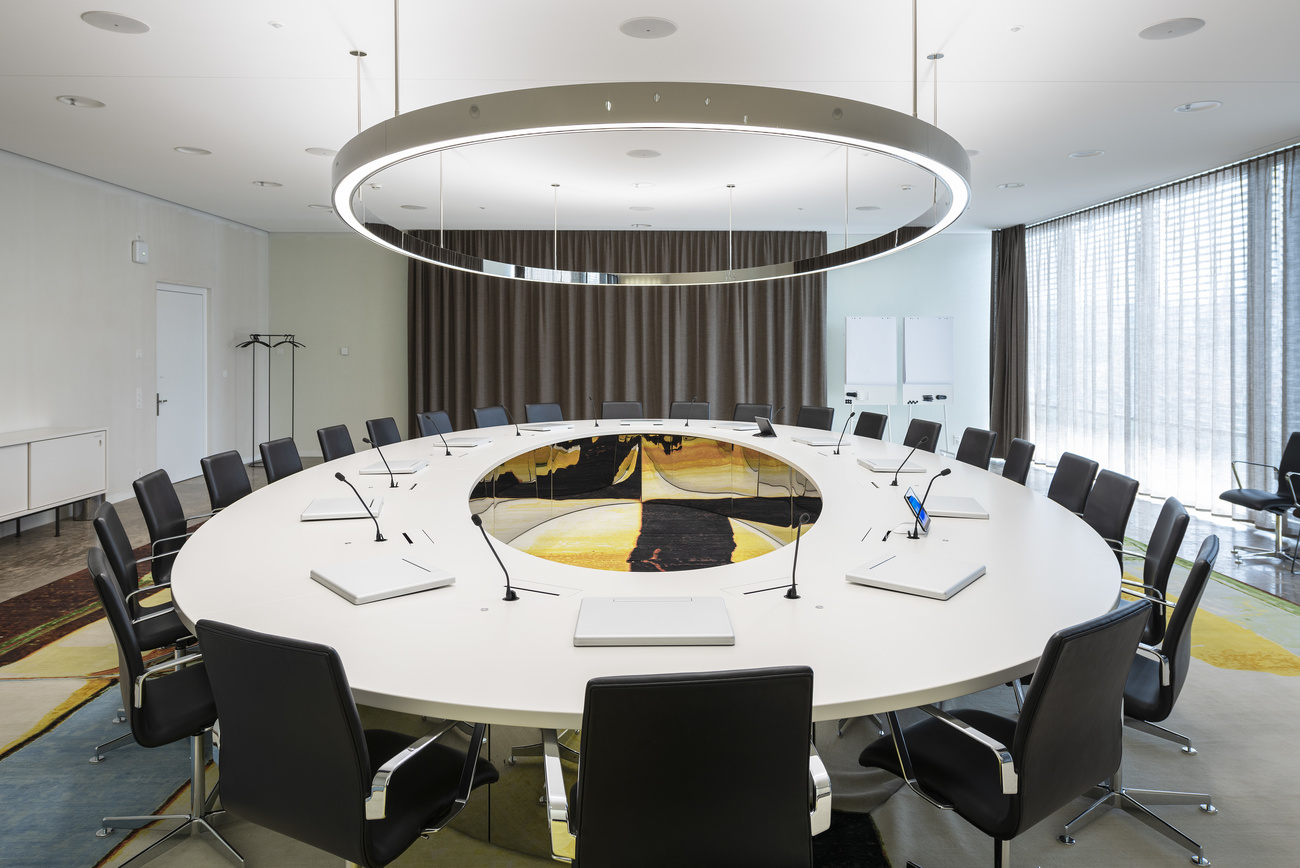
‘Advancing women in the workplace must involve men’
In Switzerland, women make up less than one in five management positions at companies listed on the Swiss Market Index (SMI). To reduce the gap, they must get men on board, argues Sandra Ondraschek-Norris with Catalyst, a global non-profit to advance women in the workplace.
The workplace is not a meritocracy. Despite 42% of 25- to 34-year-old women having a university degree, compared to 35% of men, women are still not equally represented at the top levels of business.
To see real change in the workplace, we need to get men on board. They hold the power and influence in large corporations and need to drive this change. They are the ones making the decisions on who gets hired and who gets the “hot jobsExternal link“: those high-profile, highly visibly roles with large budgets and teams, which can supercharge people to the top of an organisation. We know that women get fewer “hot jobs” than men, even though they are as well qualified.
Gender biasExternal link and gender stereotypes are some of the biggest barriers for women’s advancement in the workplace, and this is often demonstrated in the language used to describe women. Men and women are viewed as having different competencies, according to researchExternal link. Men are seen as having more leadership or “taking charge” behaviours, while women exhibit more “taking careExternal link” behaviours, which are seen not as highly valued. There is also the “think-leader-think-male” phenomenonExternal link, whereby women are not seen as effective leaders.
To stamp out gender stereotypes and sexism in the workplace, men must be involved. According to the Boston Consulting Group, External linkin companies where men are actively involved in gender diversity initiatives, 96% report progress whereas only 30% report progress when men are not involved. At a recent Catalyst MARC (Men Advocating Real Change) event in Zurich, Neil Carr, President of Dow Europe, Middle East, Africa and IndiaExternal link, said to the men in the room: “You can choose to be part of the problem or part of the solution.”
The challenge is the “how to?”. Catalyst’s Engaging Men researchExternal link found three main barriers to male involvement: apathy (74%), fear (74%) and ignorance (51%).External link We found that once men accept that the current workplace culture of men as the dominant leader is not a “fair” situation, they are more inspired to take action.
However, engaging men as advocates in gender equity initiatives will only happen if we also tackle traditional masculine norms in the workplace. While 86% of men say External linkthey want to interrupt sexism in the workplace, fewer than a third (31%) feel confident to do so. So what is holding men back?

More
Gender equality in workplace may take ‘three generations’
One barrier is “masculine anxiety”.External link This is the distress that 90% of menExternal link reported feeling at work when they feel they are not living up to society’s rigid standards of being “a man”. Masculine anxiety is heightened by hyper-competitive and combative work cultures. Speaking up or going against peers or the culture of an organisation can result in men being penalised or excluded from the in-crowd.
Strict standards of masculinity can also lead to a host of negative consequences for men, and those around them, and have been linked, for instance, to bad health behaviours, mental health issues and higher rates of suicide. Men benefit greatly from a more gender-balanced workplace. They have more freedom to be themselves, they are more involved in parenting, they enjoy healthier relationships and feel less pressure to be providers and protectors.
Challenging masculinity in the workplace requires uncomfortable conversations and the re-evaluation of traditional gender norms. An important nudge factor is when influential managers are seen to support gender equity and to show zero tolerance to sexism. If the culture at the top shows zero tolerance to such behaviours, this trickles down. Accountability is also crucial. Organisations must reward inclusive leaders and those who are actively driving culture change. Likewise, there must be consequences for those who are not modelling a commitment to equity and inclusion.
Until men are freed from the constraints of rigid masculine definitions and become advocates for equity and inclusion, we will continue to see glacial progress for women in the workplace and beyond in Switzerland.
There is no point in women being told to “be confident, speak up, lean in”, if we are still telling men to “be strong, be the breadwinner, man up”. It’s time to put a stop to these limiting gender stereotypes once and for all.

More
Study: Women slowly reaching top ranks in Swiss companies

In compliance with the JTI standards
More: SWI swissinfo.ch certified by the Journalism Trust Initiative
































You can find an overview of ongoing debates with our journalists here . Please join us!
If you want to start a conversation about a topic raised in this article or want to report factual errors, email us at english@swissinfo.ch.